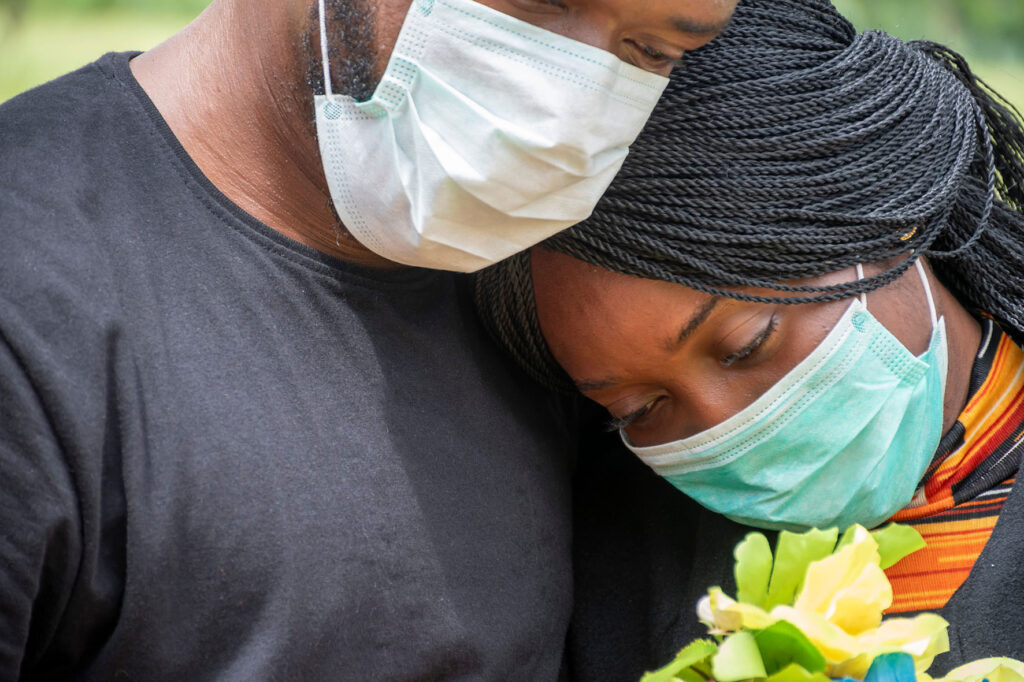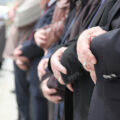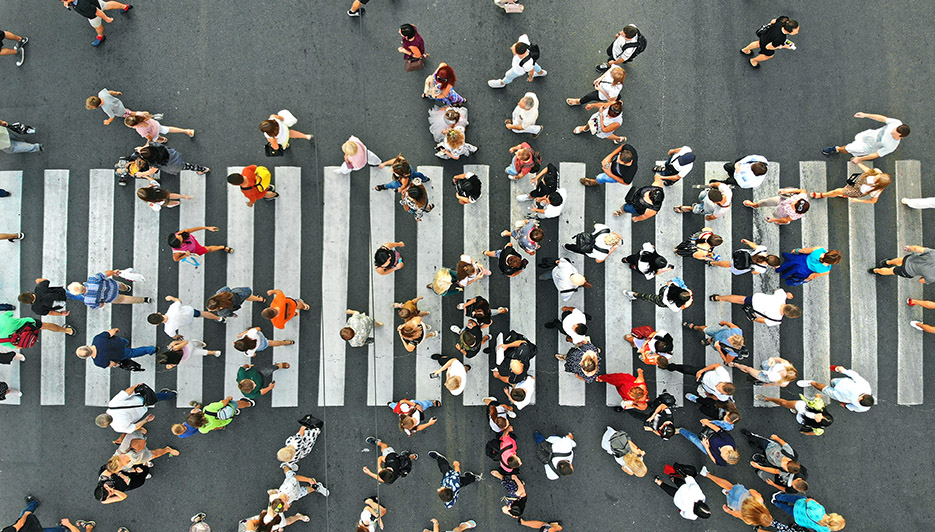A final resting place – Christianity
A final resting place: Christianity
The coronavirus has challenged one of the fundamental roles that religion provides in European society: that of carrying out funerals for the deceased. Yet the response by religions to these enforced practices has reflected how the pandemic has not only threatened traditional practices, but also led to significant adaptation by faiths across the continent. How are Christians dealing with funerals during COVID-19?
Providing answers and comfort to those suffering the loss of loved ones has long been one of the key roles that religion has brought to European society. Central to this have been the practices and customs regarding funerals which have given closure and peace of mind to many people, both religious and non-religious. However, during the first wave of the coronavirus pandemic that struck Europe in Spring 2020, the ability of religious faiths to undertake funerals according to their traditional practices was greatly threatened by the health considerations that had to be taken into account.
The virus has therefore meant a fundamental change to the practices of the two largest religions on the continent: Christianity and Islam. Customs and traditions that have existed for centuries and are a key part of the faith have suddenly been made impossible. However, whilst this has been traumatic for many, it has also forced people both inside and outside the faiths to think about funerals in new ways and to make plans for how to adapt their practices to the ‘new normal’. This article will therefore focus on how Christians, from both Catholic and Protestant churches, have seen their traditions affected by the virus. In addition, the article will make some suggestions about both the opportunities and challenges that may come in the future.
Technological adaptation
Since the pandemic began to spread rapidly in Europe in March, churches across the continent have been forced to adapt to the possibilities that technology could offer them in remaining in close contact with their followers, whilst observing social distancing and lockdown requirements. A key element of this has been the emergence of live streaming as a means of allowing followers to participate in services and events from the safety of their homes. [1][2][3][4]
In line with this, the EARS dashboard has recorded how across Europe there have been examples of churches organising the live streaming of funerals so that friends and family are able to participate virtually. This has not always been easy for both religious clergy and for the families. For example, Dutch pastor Robert Van Aken explained that he found giving funerals virtually to be more difficult than in person, a sentiment surely shared by many pastors and priests who have spent their lives providing comfort to loved ones face to face.[5] However, this adaptation to virtual funerals has also brought opportunities. In Ireland, Archbishop Diarmuid Martin explained that live streaming funerals had allowed a ‘wider range of relatives and friends to join in, even in different parts of the world’.[6] This process of streaming has also reached even the highest echelons of the Catholic Church, with Pope Benedict XVI following the funeral of his brother, Georg Ratzinger, via a stream, after the former pontiff was not able to travel to Germany to be there in person.[7] This widespread utilisation of video streaming may well be something that lasts long after coronavirus and would offer a way for those who are unable to attend funerals in person a means of participating and offering their support.
Memorials and send-offs
As well as having to adapt to the technology to continue to allow funerals to be participated in, churches have also responded to the pandemic by holding memorials and events that sought to provide wider comfort to societies facing an increase in deaths due to the pandemic. In Belgium, Bishop Johan Bonny of the Diocese of Antwerp held a prayer which was dedicated to all victims of the pandemic in his region which followed the online transmission of Sunday mass. Bonny stated that the purpose of the prayer was to ensure that the names of all those who had passed away were known by God.[8] Meanwhile, as Spain progressed beyond the first wave of the virus, a religious NGO named Messengers of Peace held a special service to remember the ‘anonymous’ victims of the pandemic. Led by the founder of the organisation, popularly-recognised priest Padre Angel, the organisation held a mass funeral for 59 victims whose bodies had not been ‘claimed’ by any family or friends and had been held by the regional government for three months.[9]
These services and memorials are a good example of how the Church has been able to provide comfort and recognition of the trauma that coronavirus has brought not only to those that have directly lost loved ones but to the society more widely.
Denial of freedoms?
Yet, whilst there have been examples from across the continent of churches both adapting their practices and stepping up to their wider civic role, there is a clear possibility that the reintroduction of limits of funerals due to a second wave of the virus will lead to political and social tension. The legal and political consequences of funeral limits made news in France in May when a group of conservative Catholic organisations took legal action regarding funeral limits. The basis of their complaint was that whilst other limits on gatherings had been loosened, funerals continued to have a limit of a maximum of 20 attendees. The organisation claimed that the fact that the state continued to impose such a limit was a fundamental infringement of their freedoms. Although the legal action was rejected by French courts, it is evidence of the type of response that some religious organisations could demonstrate in the face of the reimposition of restrictions.[10] Meanwhile, in Montenegro, protests were triggered amongst hardline Orthodox Christians after the head of the Serbian Orthodox Church in the nation was questioned by police for having broken lockdown restrictions after attending the funeral of a friend.[11]
Although not triggered by the denial of Christian practices with regards to funerals, recent developments from Israel may also be a cause for concern with regards to the potential social tensions that could be created by funeral restrictions in Europe. After Israel imposed strict lockdown restrictions to prevent the spread of the second wave of Covid-19, violent scenes were seen as police clashed with members of the ultra-Orthodox population when thousands attended the funeral of a revered rabbi who had passed away.[12] It is therefore important to consider whether funerals in Christian nations could also become a point of tension between authorities and citizens.
Looking forward
To conclude, as the reality of a widespread second wave hitting Europe through the winter of 2020-2021 becomes clear, the role that churches play with regards to funerals is of increasing importance. As this article has sought to point out, churches can play a role of accommodation to the needs of society to find closure after the death of their loved ones. However, there is also the potential that the denial of the normal practices will not lead to adaptation on the part of churches or their followers but instead to anger and even outright disobedience of the health recommendations. Managing relationships with Christian communities over the question of funerals must therefore be a key consideration for civil authorities across the continent moving forwards into winter 2020.
Learn more about religion and society on the EARS Dashboard.
[1] Coronavirus: Cathedrals and churches live stream services
[2] Geloof in coronatijd: ‘Kerken zijn niet te stoppen met hun podcasts en vlogs’ | NU – Het laatste nieuws het eerst op NU.nl
[3] Religious associations to receive €2 million in state support
[4] How Irish clergy and faith leaders are dealing with the pandemic
[5] Pastoors in Best, Son en Breugel en Sint-Oedenrode: geloof, hoop en smartphones
[6] ‘Absolutely no way’ Dublin Communions and Confirmations go ahead in May or June
[7] La lettera di Benedetto XVI ai funerali del fratello Georg: staremo insieme
[8] Rouwen in coronatijden: ‘Known unto God’
[9] El padre Ángel preside un funeral por las 59 víctimas ‘sin nombre’ del coronavirus
[10] L’épineuse question de la reprise des cultes devant le Conseil d’État
[11] Police, protesters clash in Montenegro’s north over bishop’s detention
[12] Amid rising infections, Israeli ultra-Orthodox defy lockdown






